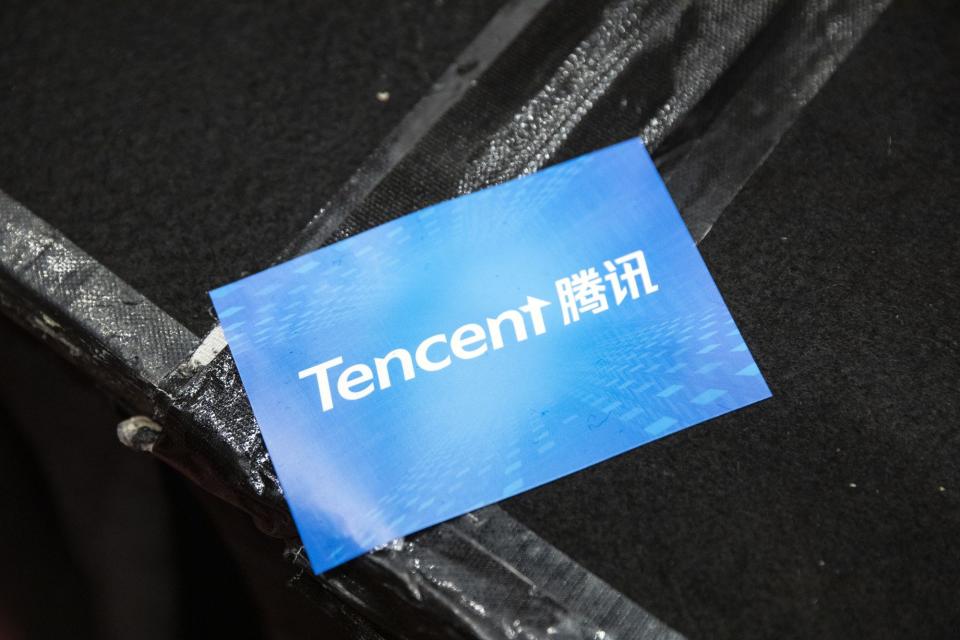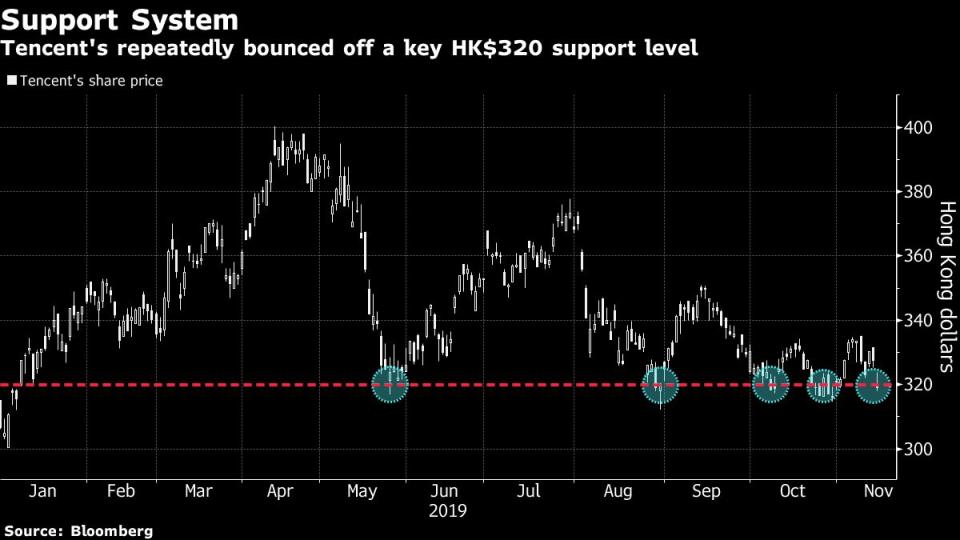Tencent Tests Key Support Level After Profit Disappoints
(Bloomberg) -- Tencent Holdings Ltd. slid almost 3% after reporting earnings below the lowest analyst’s estimate, underscoring the Chinese internet giant’s challenges in reviving growth during an economic slowdown.
The social media goliath’s profit plummeted 13% last quarter -- worse than the most pessimistic analyst anticipated -- when an economic downturn depressed advertising and prompted charges within its huge portfolio of investments. Marketers fled to nurse shrinking budgets after drama series got delayed. And costs jumped 21% as Tencent hoovered up content to feed its Netflix-style service.
Tencent was supposed to hit the comeback trail this year after a nine-month freeze on game approvals gutted its most profitable business in 2018. But the slowdown, competition from up-and-comer ByteDance Inc. for internet traffic and advertising, and now tricky political considerations is snarling that recovery. That’s a key reason its stock has vastly under-performed rival Alibaba Group Holding Ltd. this year, creating a gap of roughly $90 billion in their market valuation.
“The PC gaming and media advertising business was under pressure,” said David Dai, an analyst with Bernstein. “Fintech and cloud are doing well but we need to wait a bit longer to see them contribute more significant profit.”
Read more: Tencent Will Have to Wait a Little Longer for Its Comeback
China’s economic slowdown is dousing revenue growth across Tencent’s platforms, dampening appetite for advertising among large brands as well as subscriptions to its video and music streaming services. Sales from media advertising, including on the Netflix-like Tencent Video service, plummeted 28% as marketers cut spending while major shows got delayed. Beijing’s decision to cap game-time for underage users is also prompting Tencent to spend more on producing AAA-rated mobile titles that appeal to a global audience.
On Wednesday, the company posted net income of 20.4 billion yuan ($2.9 billion) in the September quarter. That came alongside a 90% drop in one-time gains -- an item that tracks its vast portfolio of startups around the world -- after it swallowed charges for investments in connected automobiles. Tencent fell as much as 2.9% Thursday, testing key support at around HK$320 in its biggest decline in more than two months. The company, which has shed roughly $90 billion of market capitalization this year, is now trading at about 24 times its estimated earnings for next year, about its lowest in 2019.
On Thursday, Citigroup and BOCOM International were among the brokerages that trimmed their share-price targets on Tencent. But both maintained their buy ratings and BOCOM said its HK$401 goal still implied a valuation of 31 times 2020 earnings.
Read more: Tencent Analysts See Turnaround Delay as Media Ads Disappoint
What Bloomberg Intelligence Says
Robust growth in mobile games should continue, as deferred revenue from Peacekeeper Elite is recognized in coming quarters. Tencent’s rapid internationalization of its game operations will also help.
- Vey-Sern Ling, analyst
Click here for the research.
Tencent might see light at the end of the tunnel in the fourth quarter. It hit pay-dirt with its smartphone adaptation of Call of Duty. The game garnered more than 100 million downloads in the first week, putting it ahead of Nintendo Co.’s Mario Kart Tour. That was four times more than Fortnite’s mobile version managed. That strong debut positioned it to join the other mega cash-cows in Tencent’s stable: old favorite Honour of Kings and 2019’s standout hit, Peacekeeper Elite.
It wants to replicate that success over the longer term. Tencent owns stakes in some of the biggest U.S. game studios and publishers, including the outfits that created household names Fortnite, League of Legends and World of Warcraft. The Chinese company is now counting on converting popular PC content for smartphones to re-kindle growth. The pipeline for such content stretches into 2022, the company says.
The “business strategy of Tencent remains intact to capture long-term opportunities ahead,” Thomas Chong and Ken Chong, analysts with Jefferies, wrote.
(Updates with valuation analysis from the sixth paragraph)
To contact the reporter on this story: Lulu Yilun Chen in Hong Kong at ychen447@bloomberg.net
To contact the editors responsible for this story: Peter Elstrom at pelstrom@bloomberg.net, Edwin Chan, Charlie Zhu
For more articles like this, please visit us at bloomberg.com
©2019 Bloomberg L.P.

 Yahoo Finance
Yahoo Finance 

